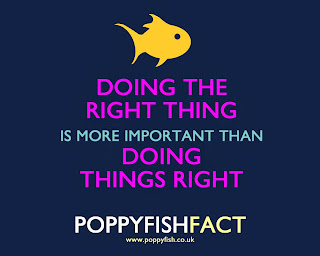Knowing the difference between effectiveness and efficiency
is not always clear in the workplace. Often the two words are used
interchangeably. So if we are to explore effectiveness in more detail then it is
important that we draw a clear definition that allows us to differentiate
between the two. Consider the following question:
Let me explain...
Which is more important; doing the right thing, or doing things right?
Take a few moments to think about this. Doing things right is an important part of getting your job done. But doing the right thing might be the most important aspect of what you do. So when it comes to working in organisations it is more important to be doing the right things than it is to be doing things right. Let me explain...
Effectiveness comes from doing the right things
whilst
Efficiency means doing things right
Efficiency and effectiveness are both important concepts, and organisations that want to be the best that they can want to achieve well in both areas, but at the end of the day it is the effectiveness that wins out. That is to say, it is more important to
be effective than efficient. Sure, efficiency is important. You can and undoubtedly should aim do things right all day long, but if
you’re not doing the right things then you may well be wasting your time. Because if
you are not doing the right things then you are not aligning your own
performance with the business needs, what you do will be
ineffective and if you are ineffective, it doesn’t matter how efficient you
are.
So being focused on doing the right things is an important
first step in being effectiveness.
Simple!
PS: This concept of doing the right thing versus doing things right is also used by Peter Drucker to explain the difference between leaders and managers. Leaders, he argues, should be doing the right thing, whilst managers should be doing things right. See also http://www.goodreads.com/book/show/48016.The_Essential_Drucker
PS: This concept of doing the right thing versus doing things right is also used by Peter Drucker to explain the difference between leaders and managers. Leaders, he argues, should be doing the right thing, whilst managers should be doing things right. See also http://www.goodreads.com/book/show/48016.The_Essential_Drucker




Comments
Post a Comment